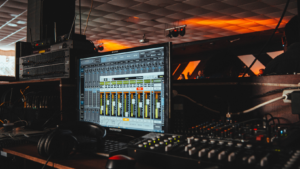In the symphony of the digital age, a new major has taken the spotlight: Music Technology. This rapidly evolving field is turning heads, blending the rhythmic pulse of music with the dynamic world of technology. It’s a harmonious intersection that’s creating a new breed of artists and technicians.
Whether you’re an aspiring musician with a knack for gadgets or a tech enthusiast with a love for tunes, a major in Music Technology could be music to your ears. This article will strike the right chord, providing an in-depth look at this exciting major. So, if you’re ready to orchestrate your future in this innovative field, read on.
Music Technology Major

Embracing the fusion of music and innovation, the Music Technology Major is an interdisciplinary discipline merging artistic flair with technical advancement. It unfolds a unique educational landscape for students, blending the creative elements of music with the precision of technology. Under this umbrella, specific pillars anchor the students’ learning experience while demonstrating their pertinent impact on the music industry.
Career Prospects with a Music Technology Major

A Music Technology Major paves the way for various rewarding career paths in the broader music industry. Armed with creative insights and technical expertise, graduates are ready to thrive in various roles.
Professionals in audio production enjoy a strong demand in a plethora of industries, not just limited to music. They’re integral parts of film production teams, television studios, and even game design companies. Companies seek their unique skill set for tasks such as sound design, music mixing, and audio editing. As an example, graduates with a Music Technology Major have potential stability in roles such as Sound Engineer, Audio Producer, or even Music Director.
Opportunities in Music Programming and Engineering
On the other hand, those looking at the more technical side can find abundant opportunities in music programming and engineering. Specialists in this field contribute to the development and improvement of music software, electronic instrument design, and audio signal processing. They’re the technologists enhancing the tools that power our music consumption and creation. Citing specifics, Music Technologists, Audio Engineers, and Sound Programmers are just a few examples of the potential roles in this area.
Selecting the Right Music Technology Program
Selecting the appropriate music technology program pivots on critical factors. Details follow under the subsequent subheadings.
Accredited Institutions for Studying Music Technology
Reliable institutions play a pivotal role in fostering a rich learning environment for music technology aspirants. Only accredited institutes, recognized by governing academic bodies, offer a legitimate degree in Music Technology. These include Berklee College of Music, New York University’s Steinhardt School, and the University of Southern California’s Thornton School, among others.
Factors to Consider When Choosing a Program
Many potential students overlook crucial aspects when selecting a music technology program. However, they must consider a few critical elements. First, it’s essential to analyze the curriculum. A comprehensive, balanced curriculum, spanning audio engineering, sound design, and digital composition, stands as an identifier of a robust program. For instance, a program offering a strong foundation in MIDI systems, DAW proficiency, and audio production procedures asserts a comprehensive learning experience.

Financial considerations also come into play when choosing a program. Students must balance tuition costs against the value offered by the program. For example, they’d look at potential return on investment, such as job placements, internship opportunities, and industry connections.
Additionally, the faculty’s expertise weighs heavily in this decision. A team of professors with relevant industry experience, noteworthy credentials and a demonstrable passion for the subject significantly improves a program’s desirability.
Lastly, potential students should also visit the institution if possible, as it offers a firsthand experience of the facility, faculty, current students, and overall atmosphere. This experience often proves invaluable in making the final decision.
By considering these aspects in the selection process, aspiring Music Technology professionals set themselves up with a potent foundation for mastering this interdisciplinary and evolving field. It holds the keys to unlocking potential career prospects available in the rapidly innovating music industry.



